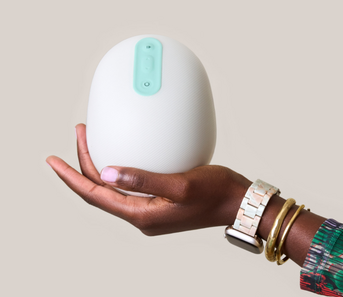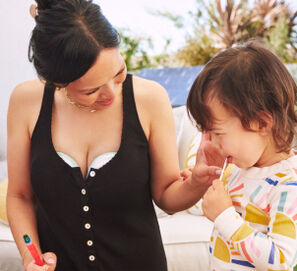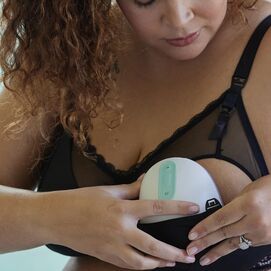If you’ve added the title “Mom” to your list of names, you’ve probably had the chance to reflect on your relationship with your own mother and may have even come to terms with the fact that she is pretty awesome. You may have not appreciated all that she did for you as a child, or continue to do for you today, but this changes fast once you become a mom yourself.
In fact, going through the experience of a daughter becoming a mom, or a mom watching her daughter become a mom, can bring about some of the strongest feelings of connection and empathy in both directions, notes Shana Averbach, M.F.T., maternal mental health therapist based in San Francisco. “The grandmother may be reminded of her own experience, and the daughter may get a strong sense of how strong love is, how hard parenting is, you name it,” she says.
For mothers and daughters who have maintained a close relationship with mutual respect and care, the process of adding a third generation can make their bond even stronger and more loving. For those with an already-challenging relationship, however, Saba Harouni Lurie, L.M.F.T., Licensed Marriage and Family Therapist and owner and founder of Take Root Therapy in Los Angeles, warns that the entrance of a new baby can actually place a strain on the relationship—and can actually bring about some not-so-feel-good emotions. “When a mother is not able to provide their daughter with emotional support, their limitations may come into stark view for the daughter, and this can be quite distressing,” she says. “For some daughters-turned mothers, there may also be a lot of grief as they consider their current needs, the needs they had that may have been neglected in childhood, and how their mother was not able to meet these needs.”
Of course, there are also many new moms who may be grieving the loss of their mother once again as they, themselves, become a new mom. In these instances, it can be especially painful to bring a child into the world, knowing that you, yourself, no longer have that figure in your own life. But it’s important to remember that just because your mom is no longer physically with you, she’s still left an indelible mark on your life—and has likely influenced so much of what you will carry into your own parenting journey. While she is not physically here to answer your pressing questions, chances are, she’s left some loving friends and family members who can. Reach out to them—her friends, her significant other, her parents if they’re still alive—to find out useful information that can help shape your own journey as a mom.
No matter the bond you have with your mother, now or in a prior stage of your life, one of the most helpful things you can do as you take on the role of mom is to take the time to ask questions—to be inquisitive in your quest to learn about your mother’s journey. Here, experts share some of the top questions to ask your mom as you become one.
What was your postpartum experience like?
You may have memories of how your mother parented during your childhood and adolescence, but there’s no way you can date as far back as your first year of life. So ask your mom about how she handled postpartum life—ask about the good, the bad, and the ugly, and then really listen to her response. “Mom may share what she is delighted in, which can allow you both to bask in such memories, she may share that she had hard times feeling worried or sad or she may even share some traumatic memories,” says Averbach. “If you learn from this conversation that there may have been a perinatal mood or anxiety disorder (which might not be said in those exact words), that's a great thing to share with your OB/GYN so that you may be on the lookout as well.” While there’s certainly no guarantee that you’ll have the same experience, a family history of a mental health issue is one risk factor that she says shouldn’t be ignored.
What did you wish you had known before becoming a mom?
This is a great question to ask because it opens the door to hearing more about her experience, as well as gaining some of her wisdom. Chances are, her answer will be filled with at least a few helpful lessons from her early motherhood period. “We are always learning and improving, and being offered the chance to learn from our mother's mistakes can allow for us to consider different paths,” says Lurie. “This also normalizes that we may make mistakes along the way, but that we are generally doing our best and that as parents, we just have to keep going.”
What was the biggest challenge for you in becoming a mom?
If your mom tells you that she didn’t have any challenges during early motherhood, you know she’s not telling the truth, so this question is really your chance to get the 411 you’re looking for. Saloumeh Bozorgzadeh, Psy.D., President of the Sufi Psychology Association, recommends not only asking your mother what her biggest challenge was when she became a mother, but also how she overcame this challenge. “Spend time having this discussion in depth and you can learn a little bit about difficulty and overcoming,” she says. “Also, seeing that everyone has challenges they have to overcome may take the pressure off you if you begin to doubt yourself and your ability.”
How can we work together to transition into these new roles?
Adding a third generation changes you both—you’ve become a parent and she has become a grandparent to your child. “A lot of relationship ruptures happen during this transition due to the basic assumption that we can read each other's minds,” says Averbach. “Directly communicating about what you need and what mom is up for providing (spoiler alert, neither of you may actually know these details accurately and that is common and a sign of being human) is your best shot at honoring your own and mom's needs.”
What are you most proud of when it comes to being my mother?
Grab a box of tissues when it’s time for this question, as it often cues the tears for you both. “This question allows the mother-turned grandmother to celebrate what she has done well,” says Averbach. “So much of our focus is on our own limitations and mistakes as parents, and offering your mother the opportunity to consider what she did well can feel good for both of you and can also give the new mother some perspective.”













